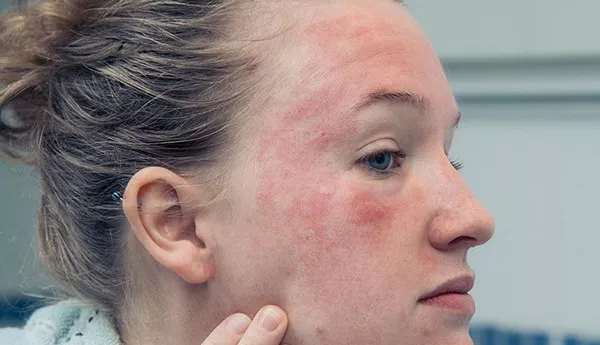Eczema, also known as atopic dermatitis, is a chronic condition that causes red, itchy, and inflamed skin. It can appear anywhere on the body, but the face is one of the most sensitive areas. Redness, flaking, and irritation are common symptoms, and they can significantly impact your appearance and comfort. If you struggle with eczema on your face, there are ways to reduce the redness and manage the condition. This article will guide you through understanding eczema on the face and the various methods to calm the redness effectively.
Understanding Eczema and Its Causes
Eczema is a skin disorder that results in irritated, itchy, and inflamed skin. It occurs when the skin barrier is weakened, which allows moisture to escape and irritants or allergens to enter. The condition often leads to flare-ups, where the skin becomes red, dry, and cracked.
There are several causes and triggers of eczema, including:
Genetics: Eczema often runs in families. If you have a family member with eczema, asthma, or hay fever, you’re more likely to develop the condition.
Environmental Factors: Cold weather, hot showers, or exposure to chemicals in soaps or skincare products can trigger eczema flare-ups.
Allergens: Certain allergens, such as dust mites, pollen, pet dander, or even food, can provoke eczema.
Stress: Emotional stress can worsen eczema symptoms. It is important to manage stress levels to help reduce flare-ups.
Understanding the underlying causes of eczema can help you avoid triggers and find effective treatments to reduce redness on your face.
Moisturizing Your Skin
One of the most important steps in managing eczema is keeping your skin well-moisturized. Eczema causes the skin barrier to become weak, leading to dryness and irritation. By using the right moisturizer, you can prevent further damage and help calm the redness.
Choose the Right Moisturizer: Look for thick, fragrance-free moisturizers that are specifically formulated for sensitive skin. Creams and ointments are usually more effective than lotions because they provide a thicker barrier to lock in moisture. Popular ingredients to look for include ceramides, hyaluronic acid, and glycerin.
Apply Moisturizer Regularly: To keep your skin hydrated, apply moisturizer immediately after bathing when your skin is still damp. This helps to trap moisture and prevent it from evaporating. Reapply throughout the day as needed, especially during dry weather or after washing your face.
Avoid Harsh Products: Steer clear of moisturizers or products that contain alcohol, fragrances, or dyes, as these can further irritate your skin.
Use Gentle Cleansers
When you have eczema on your face, it’s crucial to use a gentle cleanser to avoid stripping the skin of its natural oils. Harsh soaps can worsen eczema and increase redness. Look for cleansers that are specifically designed for sensitive skin and are free of harsh chemicals.
Choose Soap-Free Cleaners: Opt for non-foaming, soap-free cleansers that are mild and hydrating. Look for products with ingredients like aloe vera or chamomile, which are known for their soothing properties.
Avoid Hot Water: Hot water can dry out the skin and trigger eczema flare-ups. Always wash your face with lukewarm water to prevent irritation.
Pat Dry, Don’t Rub: After washing your face, gently pat your skin dry with a soft towel. Rubbing can further irritate the skin and make redness worse.
Apply Anti-Inflammatory Treatments
Inflammation is one of the main causes of redness in eczema. Therefore, using anti-inflammatory treatments can help reduce redness and soothe irritated skin.
Hydrocortisone Creams: Over-the-counter hydrocortisone creams can be helpful in reducing inflammation. They should be used sparingly and only for short periods, as long-term use can cause skin thinning. Always follow your doctor’s advice when using these creams.
Topical Calcineurin Inhibitors: These prescription creams (like tacrolimus or pimecrolimus) are another option for reducing inflammation. They are often recommended for sensitive areas like the face and can help control eczema without the side effects of steroids.
Natural Anti-Inflammatories: For those looking for natural alternatives, products containing ingredients like aloe vera, calendula, or chamomile may help reduce redness and irritation. These ingredients have soothing and anti-inflammatory properties.
Protect Your Skin from Irritants
Certain environmental factors can make eczema worse, including exposure to irritants, allergens, and extreme temperatures. Taking steps to protect your skin from these triggers can help keep redness under control.
Wear Sunscreen: Sun exposure can both irritate the skin and increase redness. Always apply a broad-spectrum sunscreen with at least SPF 30 when you’re outside. Look for sunscreens that are fragrance-free and formulated for sensitive skin to avoid flare-ups.
Limit Exposure to Hot and Cold Weather: Extreme temperatures can dry out and irritate the skin, leading to eczema flare-ups. During the winter, make sure to protect your skin with a scarf and moisturizer. In summer, wear a wide-brimmed hat or seek shade to avoid sunburn.
Avoid Harsh Chemicals: Products like fragranced laundry detergents, cleaning agents, or harsh skin care products can irritate eczema-prone skin. Choose gentle, hypoallergenic products whenever possible.
Consider Diet and Allergies
Eczema can sometimes be triggered or worsened by food allergies or sensitivities. While food is not always a direct cause of eczema flare-ups, certain foods may contribute to inflammation in some individuals. Common allergens include dairy, eggs, nuts, and gluten.
Identify Trigger Foods: If you suspect that certain foods are causing flare-ups, try eliminating them from your diet for a period of time and monitor your symptoms. Keep a food journal to track your meals and any changes in your eczema.
Consider Anti-Inflammatory Foods: Eating a diet rich in anti-inflammatory foods, such as fatty fish (like salmon and mackerel), leafy greens, and fruits high in antioxidants, can help reduce overall inflammation in the body. These foods can support your skin’s health and help manage eczema flare-ups.
Manage Stress
Stress is a known trigger for eczema, and it can make symptoms worse. When you’re stressed, your body releases chemicals that can cause inflammation and trigger eczema flare-ups.
Practice Relaxation Techniques: Techniques such as deep breathing, meditation, and yoga can help you relax and manage stress more effectively. Even simple activities like reading or listening to music can lower your stress levels and help reduce eczema symptoms.
Exercise Regularly: Regular physical activity can help reduce stress, improve circulation, and boost overall skin health. Just be sure to shower and moisturize immediately after exercising to prevent sweat from irritating your skin.
Medical Treatments
If over-the-counter treatments and lifestyle changes aren’t enough to reduce eczema redness on your face, it might be time to consult a healthcare professional for more intensive treatments.
Prescription Topical Treatments: For more severe eczema, your doctor may prescribe stronger topical treatments such as corticosteroids, calcineurin inhibitors, or even immunomodulators.
Phototherapy: In some cases, controlled exposure to ultraviolet (UV) light under the supervision of a dermatologist can help reduce eczema symptoms and promote healing.
Oral Medications: If eczema is widespread or persistent, oral medications like antihistamines, corticosteroids, or other immune-suppressing drugs may be necessary to reduce inflammation and control flare-ups.
Be Patient and Consistent
Reducing eczema redness on the face can take time, and it’s important to be consistent with your treatment routine. Don’t expect immediate results; instead, give your skin time to heal and gradually improve. Consistency in using gentle skincare products, moisturizing, and avoiding triggers will help manage the condition in the long term.
Conclusion
Eczema on the face can be frustrating, but there are several ways to reduce the redness and soothe irritated skin. Start with a good skincare routine that includes gentle cleansing, regular moisturizing, and anti-inflammatory treatments. Protect your skin from environmental irritants and manage any underlying stress or allergies. If necessary, consult with a healthcare professional for more advanced treatments. With the right approach, you can manage eczema effectively and reduce facial redness over time.
Related topics


























